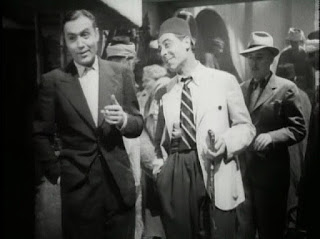Thursday, May 9, 2013
Algiers (1938)
Algiers is customarily described as being an inferior Hollywood remake of Julien Duvivier's Pépé le Moko. Duvivier's 1937 movie is widely regarded as being one of the finest examples of the French poetic realism style of the 30s (a style the French sometimes referred to as film noir). In fact Algiers does not deserve to be dismissed so lightly.
It is certainly a very faithful remake indeed, but given the aversion that American audiences have always harboured towards movies in languages other than English it made very good sense to do a remake. The story was too good to allow American audiences to miss out on it. And given that John Cromwell was a perfectly competent director, that he had the services of a very great cinematographer (James Wong Howe) and a very strong cast it would have been surprising if he had been unable to make a good movie from such material.
Pépé le Moko (Charles Boyer) is a renowned jewel thief. He is wanted by most of the police forces of Europe, and most especially by the police authorities in Paris. Pépé now resides in Algiers. When a senior police officer arrives from Paris he is astounded that the local police have not yet managed to arrest Pépé. He is even more aghast when he discovers that Inspector Slimane (Joseph Calleia) knows exactly where Pépé is and in fact sees him regularly on a social basis. With great patience Inspector Slimane and the head of the Algiers police try to explain to the Paris policeman that arresting Pépé le Moko is much more difficult than it seems.
Pépé is hiding out in the Casbah, the native quarter of the city. The Casbah is a bewildering labyrinth of narrow alleyways, and even worse it is very easy to pass from the roof of one building to another. In such a maze it is exceptionally difficult to find someone who does not want to be found. More importantly, while it would be possible to arrest Pépé it would not be possible to get him out of the Casbah. The inhabitants of the Casbah might on occasion tolerate the presence of the police but they certainly would not tolerate them if they were unwise enough to arrest somebody there.
In spite of all this Inspector Slimane is confident that he will eventually arrest Pépé, but he must be allowed to do so in his own time and in his own way. The Casbah is a safe refuge for a criminal like Pépé, but it is also in its own way a prison. If Pépé were to leave the Casbah even for a moment he would instantly be apprehended.
Pépé is very much aware of his situation, and he is not happy about it. He misses Paris. He misses Paris even more when he meets Gaby (Hedy Lamarr). Gaby is spending a vacation in Algiers with her very rich but somewhat elderly fiancé. Gaby is both beautiful and fascinating. She is the sort of woman who is, in the opinion of Pépé le Moko, worthy of a man like Pépé le Moko. And Gaby is equally fascinated by the notorious thief.
The problem for Pépé is that he cannot leave the Casbah, and Gaby is not the sort of woman who would be prepared to live in such a place. This presents Pépé with a very annoying problem, and it presents Inspector Slimane with an opportunity.
As much as I admire Jean Gabin and as much as I like his performance in Duvivier's original film, it has to be said that Charles Boyer makes an excellent Pépé le Moko. And there is the required chemistry - and plenty of it - between Boyer and Hedy Lamarr. Lamarr is excellent - aloof and amused and slightly mysterious, and vaguely exotic. She’s one major reason for seeing this film.
Joseph Calleia as Inspector Slimane goes close to stealing the picture. I know we’re supposed to see Pépé as the hero but there’s no escaping the fact that he’s a criminal and he treats his girlfriend Ines (Sigrid Gurie) abominably. I couldn’t help empathising more with the clever and determined Slimane. Alan Hale is amusing as Pépé’s friend Grandpere, a crooked Casbah jewel dealer.
James Wong Howe’s cinematography is, as always, gorgeous. He and director John Cromwell do a fine job of conveying not just the sense of mystery and intrigue of the Casbah but also the fact that it is Pépé’s prison. It always feels claustrophobic. It might be a haven from the police, but it’s not freedom.
Alpha Video’s DVD is not good but it’s better than you usually get from this company.
If Duvivier's Pépé le Moko can be film noir then there’s no reason why Cromwell’s 1938 movie should not also considered as film noir. Either way Algiers is fine entertainment. Recommended.
Subscribe to:
Post Comments (Atom)





No comments:
Post a Comment